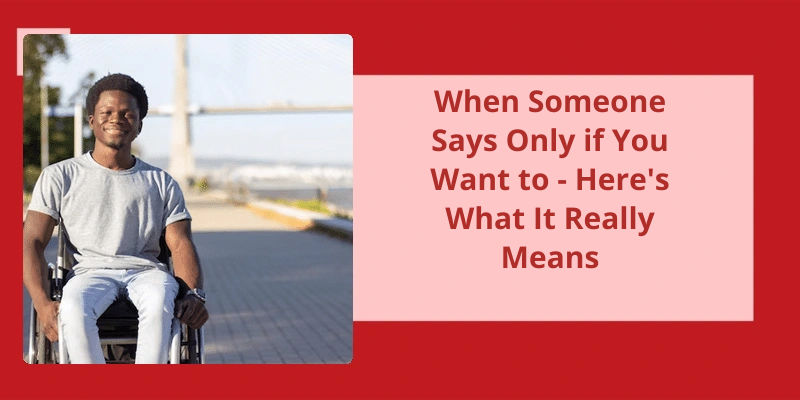Love is a complex emotion that’s the power to transform the lives of those who experience it. It’s a feeling that can make us feel on top of the world or leave us feeling vulnerable and exposed. Telling someone you love them is a huge step in any relationship, and while it may feel like the ultimate declaration of commitment, it’s not always met with the same response. So what happens when you tell a guy you love him and he doesn't say it back? It’s a situation that can be both confusing and heartbreaking, leaving you wondering if your feelings are reciprocated. However, according to relationship and communication expert Chloe Ballatore, this doesn't necessarily mean that your partner doesn't love you. It may simply be that they're not prepared with an answer, and that's okay. Understanding the nuances of relationships and love is essential to navigating the complex terrain of the human heart.
Can a Man Love You and Not Express It?
There are many reasons why a man might not express his love for you. Sometimes, it’s because they’ve been raised to believe that showing emotion is a sign of weakness. Many men have been taught that being manly means being strong and not showing vulnerability. This cultural conditioning can make it difficult for men to express their feelings, even if they do love you deeply.
Many men have experienced rejection in the past, and this can make them hesitant to express their feelings. They might worry that if they tell you they love you, you won’t feel the same way.
It’s also possible that your man expresses his love in ways other than saying “I love you.”. Some men show their love through acts of service, spending quality time together, or giving gifts. If your man is doing any of these things for you, it’s likely that he loves you deeply but simply can’t express it in words.
If you want to know whether your man loves you, look for other signs and signals. Does he prioritize your needs and wants? Does he make time for you? Does he listen to you when you talk? These are all signs that he cares about you deeply, even if he doesn’t say “I love you” all the time.
Encourage him to express his emotions and be willing to listen without judgment. Remember that just because he doesn’t say “I love you” all the time, it doesn’t mean that he doesn’t love you deeply.
The Impact of Past Traumas on Emotional Expression and Communication in Relationships
This topic covers the effects of experiencing past traumas on a person’s ability to express emotions and communicate effectively in their relationships. It can result in difficulties forming and maintaining relationships due to trust issues, fear of vulnerability, and emotional numbness.
However, it can understandably leave the person who didn’t receive the response feeling uncertain or even hurt. There are many reasons why someone may not say “I love you” back and it’s important to explore these reasons before jumping to any conclusions about the state of your relationship.
Is It Normal for Someone to Not Say I Love You Back?
There are several reasons why someone may not say “I love you” back to their partner. For some individuals, saying those three little words carries a lot of weight and meaning, and they may need more time to feel comfortable expressing their emotions. They may also have a fear of vulnerability, or have past experiences with love that make them hesitant to say those words. Alternatively, they may not feel the same level of affection as their partner and not want to lie or mislead them.
Communication is key in any relationship, and it’s important to have a conversation about what those words mean to both partners. It could be that one person has a different understanding of love or uses the term more freely than the other. Being open and honest about expectations and intentions can help prevent misunderstandings and hurt feelings.
It’s also important to remember that love isn’t always verbalized. Showing love through actions, such as acts of service, quality time, or physical touch, can be just as meaningful as saying the words. Partners should take the time to understand each others love language and find ways to express affection in a way that feels authentic to them.
Ultimately, the decision to say “I love you” is a personal one, and each individual should feel comfortable expressing their emotions in a way that feels right to them. Pressuring someone to say those words before theyre ready can do more harm than good, and may ultimately damage the relationship.
It’s important to have open and honest communication about expectations and intentions, and to respect each others personal feelings and boundaries. Love isn’t always verbalized, and partners can show affection through actions that align with their love language. The decision to express love should be a personal one, and not something that’s forced or pressured.
Advice for Dealing With a Partner Who Never Says “I Love You” or Shows Affection in a Way That Feels Meaningful to Their Partner.
- Communicate openly about your needs and feelings
- Avoid making assumptions about your partner’s feelings
- Try to understand their perspective and communication style
- Explore different ways of showing affection that may resonate with them
- Consider seeking couples therapy or individual therapy to work on communication and relationship issues
Conclusion
It’s important for individuals to understand that expressing emotions can be a vulnerable experience, and not everyone may be ready to reciprocate them at the same pace. While it can be disappointing to not receive an immediate response, it’s crucial to communicate openly and discuss the emotions involved within the relationship. True love involves patience, understanding, and willingness to work through any challenges that arise. Ultimately, it’s up to both partners to determine their own feelings and communicate them honestly to each other, creating a strong foundation for a healthy and happy relationship.






